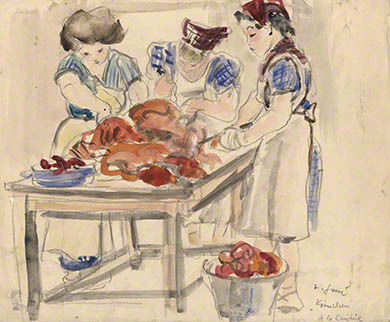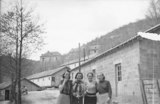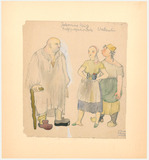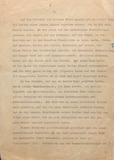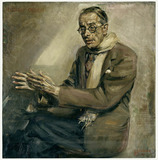Sylta Busse: Women performing kitchen work in the Rieucros internment camp, drawing (1940)
Sylta Busse: Women performing kitchen work in the Rieucros internment camp, drawing (1940)
Studien kann man hier machen, einfach toll!!! Meine Baracke ist besonders gemischt, aber viele nette Frauen dabei neben recht unangenehmen; ich komme aber mit allen gut aus. Am nettesten sind die kleinen Spanierinnen.
[You can do studies here, how wonderful!!! My barrack is very mixed, but there are many nice women here alongside the unpleasant ones; but I get along well with them all. The small Spaniards are the nicest. (ed. trans.)]
Sylta Busse in a letter to János Reismann, dated 7 March 1940.
In order to satisfy the correspondence censorship of the camp, Sylta Busse presumably had to adopt a cheerful tone in the letter to her husband János Reismann, who was able to live freely as a Hungarian photographer in Paris, yet she is genuinely enthusiasm about the possibility of producing artistic studies. In early 1940 Sylta Busse, who after their return from the USSR in 1938 had worked as a costume designer at the Parisian emigrant theatre Die Laterne, was arrested and sent to the women's internment camp of Rieucros par Mende. Initially she used the time to draw and paint and had portfolios, ink, pens and quills sent from Paris. This work helped her to overcome dark moods and she even traded portrait drawings for fruit. She was soon renowned throughout the camp for walking around with her drawing pad and bag. The opportunity of meeting the other women prisoners helped her to develop her sketching ability. She noted how the women in the kitchen cooked the food, how they washed themselves, talked to each other, sat in the barracks or engaged in handicrafts. The drawings in her sketch books were not, however, naturalistic. Busse also captured attitudes and types which she was familiar with from art history or which could be used for the theatre. After a few weeks in the camp, Sylta Busse contracted tuberculosis and had to be taken to a hospital. Back in Rieucros she managed to escape in November 1940 with the help of her husband.

